Contents
The Sociolinguistics of Ethiopian
Sign Language
Ceil Lucas and Jordan Fenlon, General Editors
VOLUME 1 Sociolinguistics in Deaf Communities
VOLUME 2 Multicultural Aspects of Sociolinguistics in Deaf Communities
VOLUME 3 Deaf Children in Public Schools
VOLUME 4 Pinky Extension and Eye Gaze: Language Use in Deaf Communities
VOLUME 5 Storytelling and Conversations: Discourse in Deaf Communities
VOLUME 6 Bilingualism and Identity in Deaf Communities
VOLUME 7 Sociolinguistic Variation in American Sign Language
VOLUME 8 Turn-Taking, Fingerspelling, and Contact in Signed Languages
VOLUME 9 Language and the Law in Deaf Communities
VOLUME 10 To the Lexicon and Beyond: Sociolinguistics in European Deaf Communities
VOLUME 11 The Rising of Lotus Flowers: Self-Education by Deaf Children in Thai Boarding Schools
VOLUME 12 Multilingualism and Sign Languages: From the Great Plains to Australia
VOLUME 13 Sign Languages in Contrast
VOLUME 14 Hearing, Mother Father Deaf: Hearing People in Deaf Families
VOLUME 15 Extraordinary from the Ordinary: Personal Experience Narratives in American Sign Language
VOLUME 16 Language Policy and Planning for Sign Languages
VOLUME 17 Discourse in Signed Languages
VOLUME 18 Language Attitudes in the American Deaf Community
VOLUME 19 Form, Meaning, and Focus in American Sign Language
VOLUME 20 Teaching and Learning in Bilingual Classrooms: New Scholarship
VOLUME 21 International Sign: Linguistic, Usage, and Status Issues
VOLUME 22 Understanding International Sign: A Sociolinguistic Study
VOLUME 23 The Sociolinguistics of Ethiopian Sign Language: A Study of Language Use and Attitudes
The Sociolinguistics
of Ethiopian Sign
Language
A Study of Language Use
and Attitudes
Eyasu Hailu Tamene
GALLAUDET UNIVERSITY PRESS
Washington, DC
Sociolinguistics in Deaf Communities
A Series edited by Ceil Lucas and Jordan Fenlon
Gallaudet University Press
Washington, DC 20002
http://gupress.gallaudet.edu
2017 by Gallaudet University
All rights reserved. Published 2017
Printed in the United States of America
ISBN 978-1-56368-672-6
ISSN 1080-5494
 This paper meets the requirements of ANSI/NISO Z39.48-1992
This paper meets the requirements of ANSI/NISO Z39.48-1992
(Permanence of Paper).
Contents
Acknowledgments
Thank you God for giving me strength and patience and for guiding me step-by-step to where I am today.
I would first like to thank my two supervisors for their special contributions toward the completion of this research. I am profoundly grateful to Prof. Bencie Woll, my supervisor at the Deafness, Cognition and Language Research Centre (DCAL) at University College London for her generous arrangement of my stay at DCAL where I gained a wealth of knowledge on sign language linguistics. I am grateful for her kindness and her contribution to numerous issues throughout the project. Special thanks go to my home supervisor, Prof. Orin Gensler (Gashe Orin), for his friendship and scholarly encouragement at each level of this research. He has given me constructive comments and criticisms on the research, and moral support since long before the inception of the research. All my conversations with him were valuable and friendly; in his criticisms he took all my suggestions and ideas seriously, which made me develop confidence in my work.
I would like to say thank you to Addis Ababa University for being the pioneer in Africa to launch a BA program on Ethiopian Sign Language and Deaf Culture, and the host, the Department of Linguistics, for sponsoring and creating the atmosphere to complete my research on Ethiopian Sign Language. Many thanks go to my former instructor and MA advisor, Prof. Zelealem Leyew, who inspired me to carry on my research on language use and attitudes. While I preferred to revisit the original manuscript for publication, I instead got a lot of support and encouragement from Prof. Ceil Lucas to put it in the present form, in which I am indebted to her kindness.
My stay at DCAL has enabled me to shape the research in its present form. I thank all the staff of DCAL for making my stay a fascinating and wonderful learning experience. From the day I set foot in England till the day I returned home, I found my life enriched by formal and informal conversations with many people. Some of them are Dr. Manjula Patrick, Dr. Kearsy Corimer, Dr. Pamela Perniss, Dr. Jordan Fenlon, Dr. Robert Adam, Dr. Rose Stamp, Heather Payne, Dr. Christopher Stone, Andrea Davenport, and the BSL interpreters (Alan Wendt and Elizabeth Graham). I also thank Prof. Adam Schembri for giving me time to discuss some of the research issues in person.
I want to thank my friends in London who made my stay a wonderful and fun experience: Daniel Mesfun, Ghion Mekonnen and his family, Sium Ghile, Rezene Woldeyesus, Michael Haile, and Betty Admassie and her family. You are always in my heart and mind for your kind hospitality and friendship. I also would like to thank Simon Godziek, Kamala Achu, and Maggie Owen who made me welcome at their place in London.
I am deeply indebted to all of the 155 participants in my PhD research. Deaf association leaders, Deaf school principals and teachers, parents, and community leaders all across Ethiopia have really showed their support and encouragement toward the development of Deaf childrens education. A special thanks go to my Deaf research assistants, who were my former students, for undertaking the indispensable hard work of assisting me in interviewing the Deaf participants: Fitsum Tafesse, Kidane Admassu, Demisachew Workie, and Woinshet Girma. Thanks go to Wondwossen Aynalem, Baye Eyasu, Birhanu Kiniso, and Yirgalem Edilu for taking the burden of translating the whole mass of signed video data into English text. I also thank Demeke Kebede for assisting me during data collection and text conversion. All of their assistance is truly priceless.
Since I first joined the Deaf world, 10 years ago, there are a number of people whose work and life have been an inspiration to me. The story of Andrew Foster and William Stokoe impresses me for their hard work and patience in laying the foundation for the promotion of Deaf education in Africa and the development of sign languages, respectively. The groundwork they laid has contributed significantly toward changing the lives of Deaf people across the globe. I have been equally impressed and inspired by a mentor, a colleague, a leader and, as many Deaf Ethiopians label him, the father of the Ethiopian Deaf community, Ato Alemayehu Teferi. I thank him for his diligent and visionary activity toward changing the lives of the Ethiopian Deaf community. I also thank him for giving me his valuable comments on the draft manuscript.
I want to thank the late Pastor Bizuayehu Assefa, Merigeta Yiheyis Channie, artist Zewdu Tsehai, Ato Getahun Kebede, Wro. Gomeju Taffes, Ato Awlachew Admassu, and Rev. Bahiru Tamiru, who are among the Ethiopian Deaf community leaders, for giving me advice and encouraging me to keep on with the research. They have always wished to see me complete this work as a contribution toward the development of Deaf education in Ethiopia.
Gratitude is also extended to Anja Malm, Marieke Boersma, and Rosaline Both for their important discussions and friendship. I also thank Dr. Girma Awgichew, my former instructor, for supporting my research by sharing with me some of his books. I thank Dr. Joseph Hill for his comments on the draft thesis. Many thanks go to my friends Dr. Amsalu Tefera, Dr. Endalew Assefa, Biruk Kidane, Endale Assefa, Meskerem Beyene, Semhal Berhe, Getachew Melaku, Awgichew Arega, and Yared Girma for their encouragement toward the research. I also thank little Befikir for adding fun, joy, and nice hospitality during all the times I met with Gashe Orin at his home.

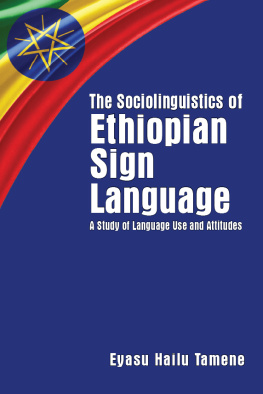
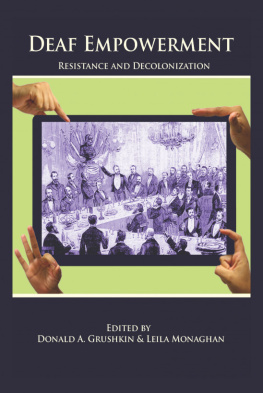
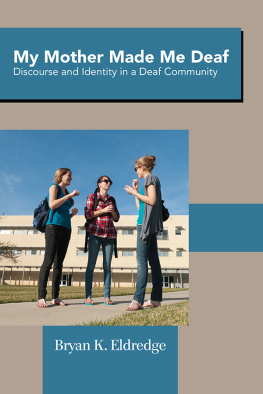
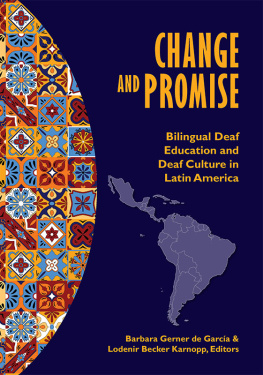


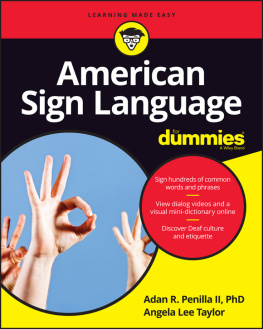
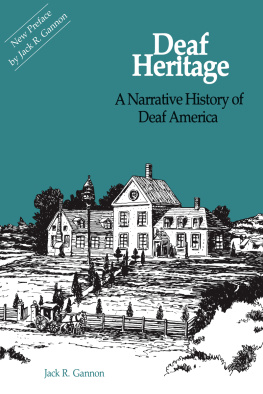
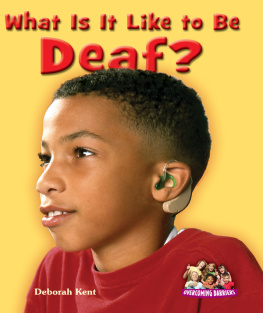
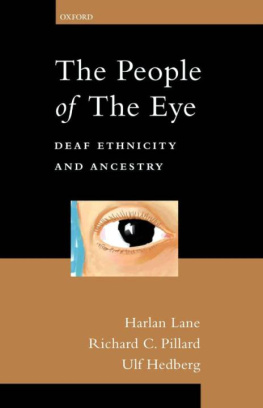


 This paper meets the requirements of ANSI/NISO Z39.48-1992
This paper meets the requirements of ANSI/NISO Z39.48-1992